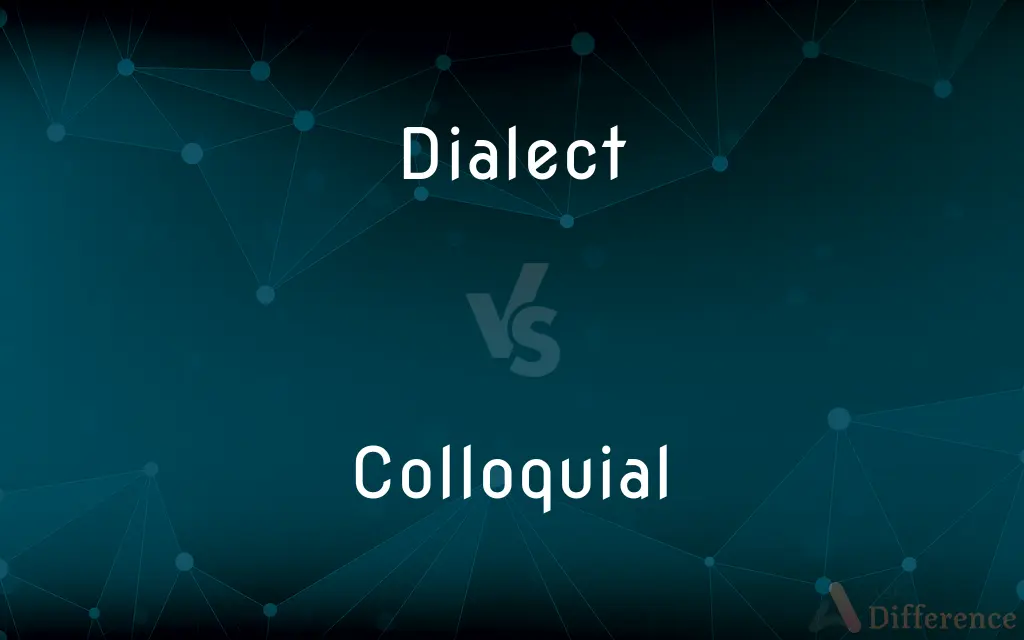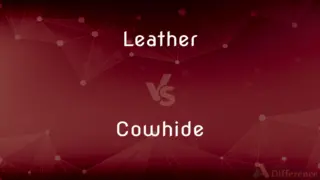Dialect vs. Colloquial — What's the Difference?
By Maham Liaqat & Urooj Arif — Updated on April 30, 2024
Dialects are regional or social variations of a language, characterized by distinct vocabulary, grammar, and pronunciation, whereas colloquialisms are informal terms or expressions used in everyday speech.

Difference Between Dialect and Colloquial
Table of Contents
ADVERTISEMENT
Key Differences
Dialects encompass the broad variations in language that occur across different geographical areas or among different social groups, featuring unique lexical choices, grammatical structures, and phonetics. Colloquialisms, on the other hand, refer specifically to informal words or phrases that are often used in casual conversation and may vary widely even within the same dialect.
A dialect may have a set of recognized grammar and pronunciation rules that differ from the standard language form. Colloquial language, however, primarily involves informal expressions that might not adhere to the formal rules of grammar and are often region-specific within the dialect itself.
Speakers often use dialects unconsciously, influenced by regional or cultural backgrounds, which can serve as a marker of identity or social belonging. Whereas colloquialisms are chosen more deliberately to convey familiarity, ease, or social informality.
In education and formal communications, dialects can sometimes be a focus of study or adaptation, especially in multilingual settings. Colloquialisms, however, are generally avoided in formal writing or speaking due to their informal nature.
Dialects can be documented and analyzed in linguistic studies as they provide insights into the historical and cultural evolution of language. Colloquial expressions, while also studied, are noted for their dynamic and evolving nature, reflecting current trends and social attitudes.
ADVERTISEMENT
Comparison Chart
Definition
A regional or social variation of a language.
Informal words or phrases used in casual conversation.
Scope
Includes vocabulary, grammar, and pronunciation.
Primarily involves vocabulary.
Formality
Can be formal or informal, depending on the setting.
Generally informal and casual.
Usage in Writing
Sometimes used in literature to convey authenticity.
Rarely used in formal writing.
Sociolinguistic Role
Marks regional or social identity.
Indicates casualness or informality.
Compare with Definitions
Dialect
A regional variety of a language distinguished by vocabulary, grammar, and pronunciation.
The Scottish dialect is fascinating due to its unique terms and accents.
Colloquial
Everyday language that is not suitable for formal occasions.
She used colloquial expressions that were too casual for the formal meeting.
Dialect
A linguistic expression characterized by its variation from the standard language.
The use of y'all is a common feature in the Southern United States dialect.
Colloquial
Informal speech or language patterns used among friends and family.
Gonna is a colloquial form of going to.
Dialect
A subset of a language that is not a standard but is comprehensible to speakers of the standard language form.
Yorkshire dialect has distinct pronunciations and vocabulary that set it apart.
Colloquial
Expressions that simplify formal language for ease of conversation.
Colloquial language makes dialogues in novels sound more natural.
Dialect
A form of a language spoken in a particular geographical area or by a specific group.
Appalachian dialects in the United States vary significantly from one area to another.
Colloquial
Language that conveys familiarity and comfort.
His colloquial way of speaking made everyone in the room relax.
Dialect
The linguistic features that differentiate groups of speakers.
Dialect differences can sometimes lead to misunderstanding among speakers of the same language.
Colloquial
Slang or idiomatic expressions used by particular groups.
Teenagers often use colloquial slang that baffles older generations.
Dialect
The term dialect (from Latin dialectus, dialectos, from the Ancient Greek word διάλεκτος, diálektos 'discourse', from διά, diá 'through' and λέγω, légō 'I speak') can refer to either of two distinctly different types of linguistic phenomena: a variety of a language that is characteristic of a particular group of the language's speakers. Under this definition, the dialects or varieties of a particular language are closely related and are often mutually intelligible, especially if close to one another on the dialect continuum.
Colloquial
(of language) used in ordinary or familiar conversation; not formal or literary
Colloquial and everyday language
Colloquial phrases
Dialect
A particular form of a language which is peculiar to a specific region or social group
The Lancashire dialect seemed like a foreign language
Colloquial
Characteristic of or appropriate to the spoken language or to writing that seeks the effect of speech; informal.
Dialect
A regional or social variety of a language distinguished by pronunciation, grammar, or vocabulary, especially a variety of speech differing from the standard literary language or speech pattern of the culture in which it exists
Cockney is a dialect of English.
Colloquial
Relating to conversation; conversational.
Dialect
A variety of language that with other varieties constitutes a single language of which no single variety is standard
The dialects of Ancient Greek.
Colloquial
(linguistics) Characteristic of familiar conversation, of common parlance; informal.
Dialect
The language peculiar to the members of a group, especially in an occupation; jargon
The dialect of science.
Colloquial
Of or pertaining to a conversation; conversational or chatty.
Dialect
The manner or style of expressing oneself in language or the arts.
Colloquial
A colloquial word or phrase, colloquialism
Dialect
A language considered as part of a larger family of languages or a linguistic branch. Not in scientific use
Spanish and French are Romance dialects.
Colloquial
Pertaining to, or used in, conversation, esp. common and familiar conversation; conversational; hence, unstudied; informal; as, colloquial intercourse; colloquial phrases; a colloquial style.
His [Johnson's] colloquial talents were, indeed, of the highest order.
Dialect
A lect (often a regional or minority language) as part of a group or family of languages, especially if they are viewed as a single language, or if contrasted with a standardized idiom that is considered the 'true' form of the language (for example, Cantonese as contrasted with Mandarin Chinese or Bavarian as contrasted with Standard German).
Colloquial
Characteristic of informal spoken language or conversation;
Wrote her letters in a colloquial style
The broken syntax and casual enunciation of conversational English
Dialect
A variety of a language that is characteristic of a particular area, community, or social group, differing from other varieties of the same language in relatively minor ways as regards grammar, phonology, and lexicon.
Dialect
(pejorative) Language that is perceived as substandard or wrong.
Dialect
A language existing only in an oral or non-standardized form, especially a language spoken in a developing country or an isolated region.
Dialect
A variant of a non-standardized programming language.
Home computers in the 1980s had many incompatible dialects of BASIC.
Dialect
(ornithology) A variant form of the vocalizations of a bird species restricted to a certain area or population.
Dialect
Means or mode of expressing thoughts; language; tongue; form of speech.
This book is writ in such a dialectAs may the minds of listless men affect.Bunyan.The universal dialect of the world.
Dialect
The form of speech of a limited region or people, as distinguished from ether forms nearly related to it; a variety or subdivision of a language; speech characterized by local peculiarities or specific circumstances; as, the Ionic and Attic were dialects of Greece; the Yorkshire dialect; the dialect of the learned.
In the midst of this Babel of dialects there suddenly appeared a standard English language.
[Charles V.] could address his subjects from every quarter in their native dialect.
Dialect
The usage or vocabulary that is characteristic of a specific group of people;
The immigrants spoke an odd dialect of English
He has a strong German accent
Common Curiosities
How do dialects differ from languages?
Dialects are subsets of a language and usually mutually intelligible among speakers of the same language, whereas languages are broader and may not be mutually intelligible.
Can a colloquial expression be part of a dialect?
Yes, colloquial expressions can be part of a dialect but are specifically informal and casual within that dialect.
Why are colloquialisms generally avoided in formal writing?
Colloquialisms are avoided in formal writing because they are informal and can seem unprofessional or too casual.
What does colloquial mean?
Colloquial refers to informal speech or expressions typically used in casual conversations.
Can understanding dialects help in learning a language?
Understanding dialects can provide deeper insights into the culture and variations of a language, aiding in more comprehensive learning.
Is it necessary to avoid colloquial language in all formal communications?
In most formal communications, it is advisable to avoid colloquial language to maintain professionalism and clarity.
Can the use of dialects create barriers in communication?
The use of strong dialects can sometimes create barriers in communication, especially among speakers from different regions or social groups.
How do linguists study dialects?
Linguists study dialects by analyzing speech patterns, vocabulary, and grammar among different groups and regions.
What is a dialect?
A dialect is a regional or social variation of a language with distinct vocabulary, grammar, and pronunciation.
Are dialects considered incorrect or improper forms of a language?
Dialects are not incorrect or improper; they are legitimate forms of a language with their own rules and are culturally significant.
Are colloquialisms universally understood?
Colloquialisms are not universally understood and often require contextual knowledge of a specific culture or community.
Can someone speak without any dialect?
It is nearly impossible to speak without any dialect as everyone adopts patterns from their surroundings and cultural background.
How do dialects and colloquialisms affect language evolution?
Both dialects and colloquialisms contribute to the evolution of language by introducing new expressions and usage patterns.
Why might someone intentionally use colloquial language?
Someone might use colloquial language to create a sense of ease, to relate more closely with the audience, or to express cultural identity.
What role do colloquialisms play in literature?
Colloquialisms can add authenticity and relatability to characters and dialogues in literature.
Share Your Discovery

Previous Comparison
Irritation vs. Annoy
Next Comparison
Leather vs. CowhideAuthor Spotlight
Written by
Maham LiaqatCo-written by
Urooj ArifUrooj is a skilled content writer at Ask Difference, known for her exceptional ability to simplify complex topics into engaging and informative content. With a passion for research and a flair for clear, concise writing, she consistently delivers articles that resonate with our diverse audience.
















































